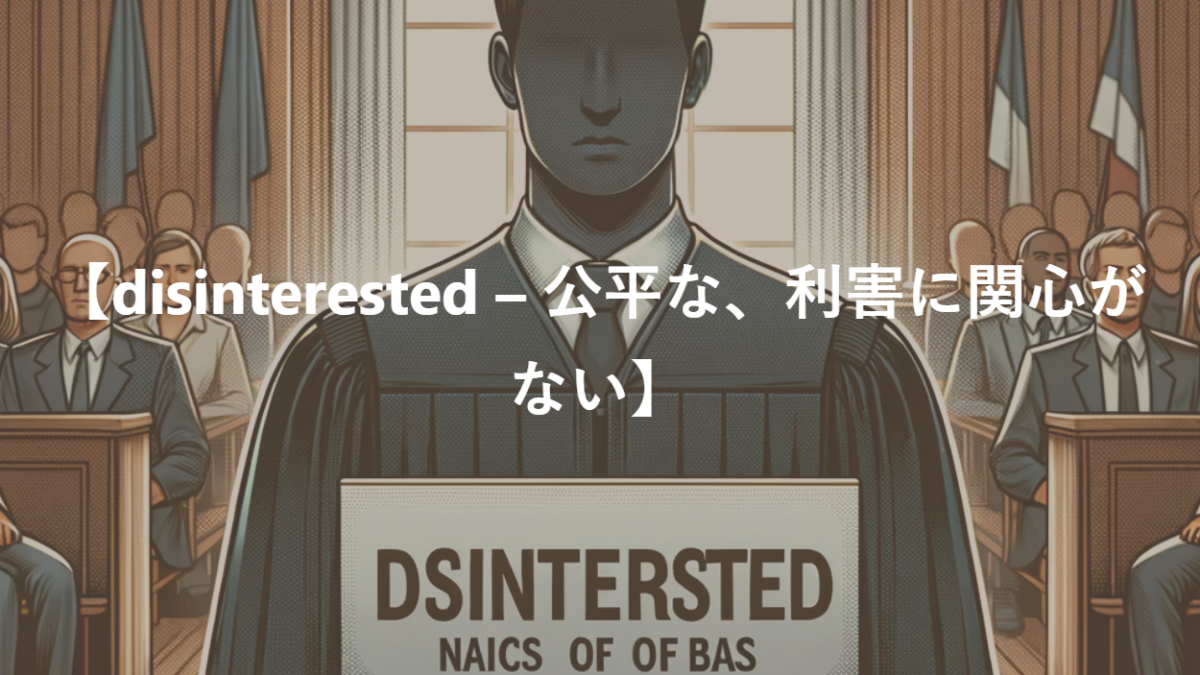語源・類義語・反対語・例文
【disinterested – 公平な、利害に関心がない】という単語の語源とか由来を知っていますか?
「Disinterested」(公平な、利害に関心がない)という単語は、元々は「interested」(興味がある、関心がある)という単語に否定の接頭辞「dis-」が付加された形で生まれました。この「dis-」は、ラテン語に由来し、「無」や「非」などの否定の意味を持ちます。「Interested」自体は、ラテン語の「interesse」から派生した言葉で、「重要である」「関与する」という意味があります。
従って、「disinterested」はもともと「利害に関与しない」や「関心がない」という意味で使われていました。時間が経つにつれて、この単語は「個人的な利害や偏見がなく、公平な」という意味で使われるようになりました。現代英語においては、「disinterested」は特に、自己の利益を抜きにして物事を考える能力、つまり「公平性」や「客観性」を持つことを意味する言葉として使用されます。
The word “disinterested” originally formed by adding the negative prefix “dis-” to the word “interested.” This “dis-” comes from Latin and carries negative meanings such as “not” or “un.” “Interested” itself derives from the Latin “interesse,” meaning “to be important” or “to be involved.”
Therefore, “disinterested” was initially used to mean “not involved in interests” or “lacking interest.” Over time, this word has come to be used with the meaning “having no personal interest or bias, and being fair.” In contemporary English, “disinterested” is particularly used to denote the ability to think about things without considering one’s own benefit, meaning “fairness” or “objectivity.”
この単語の類義語・反対語を教えてください。
類義語
- Impartial: 偏らない、公平な。
- Unbiased: 偏見がない。
- Neutral: 中立的な。
- Objective: 客観的な。
- Detached: 係わりのない、超然とした。
反対語
- Biased: 偏った、先入観がある。
- Partial: 偏りのある。
- Interested: 興味を持っている、関心がある。
- Subjective: 主観的な。
- Involved: 関与している。
似た単語で間違いやすい単語はありますか?
- Disinterested:この単語は、個人的な利害や偏見がなく、公平または客観的であることを意味します。例えば、裁判官や調停者が公平であることを示すために使われます。利益の衝突がなく、中立的な立場を指します。
- Uninterested:この単語は、何かに対して興味や関心がないことを意味します。感情的な関与や関心が欠けている状態を表します。
例文をいくつか教えてください
The judge needs to remain disinterested to ensure a fair trial.
裁判官は公正な裁判を保証するために、利害に関心がない状態を保つ必要があります。
As a disinterested observer, she provided an unbiased account of the events.
公平な観察者として、彼女は出来事について偏見のない報告を提供しました。
We sought advice from a disinterested third party to avoid any conflict of interest.
利害の衝突を避けるために、利害に関心がない第三者からアドバイスを求めました。
His disinterested love for humanity inspired many to volunteer for the cause.
彼の人類に対する無償の愛は、多くの人々をボランティア活動に駆り立てた。
In order to mediate effectively, the mediator must be completely disinterested.
効果的に仲介するために、調停者は完全に利害に関心がない状態でなければなりません。
【disinterested – 公平な、利害に関心がない】のコロケーション
- Disinterested observer (公平な観察者): どちらかに偏らずに事象を見る人を指します。この表現は、中立的な立場からの観察や評価が求められる状況で使われます。
- Disinterested advice (公平な助言): 自己の利益を考慮せずに与えられる誠実な助言を意味します。信頼できるかつ偏りのないアドバイスを求める際に使用されます。
- Disinterested judgement (公平な判断): 個人的な利益や偏見に影響されずに下される判断です。このフレーズは、正義や公正を確保する必要がある状況で特に重要です。
- Disinterested party (利害関係のない当事者): ある事象や問題について個人的な利害関係を持たない人々やグループを指します。紛争解決や公平な審査を行う際に用いられます。
- Disinterested analysis (公平な分析): 個人的な感情や利害関係に左右されない、客観的な分析を指します。このフレーズは、研究や評価を行う際に、中立的かつ客観的な視点が求められる場合に使用されます。
「Disinterested」という形容詞は、偏りのない判断や意見を示す際に用いられます。これは、特定の事象や問題に対して、個人的な利害や感情を抜きにした中立的な立場からのアプローチを意味します。ここでは、「disinterested」を含む一般的な言い回しやその文脈について説明します。
「Disinterested observer」という表現は、事象を中立的な視点から観察する人を指します。これは、客観的な分析や報告が求められる場合、特に研究や審査の文脈で使われます。
「Disinterested advice」というフレーズは、自己の利益を一切考慮せずに提供される真摯な助言を意味します。これは、誠実で信頼性の高いガイダンスが必要な時、たとえば友人や専門家からの意見を求める際に適用されます。
「Disinterested judgement」は、個人的な利害や偏見に影響されない公平な判断を示します。これは、法的な判断や倫理的な決定を下す場合など、正義や公正が特に重視される状況で使用される言葉です。
「Disinterested party」というコロケーションは、特定の問題に対して個人的な利害関係を持たない人々やグループを指します。これは、中立的な立場からの意見や解決が必要な交渉や審判の文脈で用いられます。
最後に、「Disinterested analysis」は、個人的な感情や利害を排除した客観的な分析を意味します。これは、研究やレビューを行う際に、公正かつ中立的な視点を維持する必要がある場合に使われます。
これらの例を通して、「disinterested」という単語がどのようにして公平性や客観性を表現し、偏りのない判断やアプローチを強調するのに役立つかが理解できます。
The adjective “disinterested” is used when indicating impartial judgments or opinions. It signifies an approach that is free from personal interests or emotions when addressing a particular event or issue. Here, we explain common expressions involving “disinterested” and their contexts.
“Disinterested observer” refers to someone who observes an event from a neutral perspective. This is used, especially in research or review contexts, when objective analysis or reporting is required.
“Disinterested advice” denotes sincere guidance provided without considering one’s own benefits. It applies when seeking honest and trustworthy opinions, for example, from friends or experts.
“Disinterested judgement” represents a fair decision made without being influenced by personal interests or biases. This phrase is used in situations where justice or fairness is of paramount importance, such as legal decisions or ethical determinations.
“Disinterested party” is a collocation that points to individuals or groups without personal stakes in a particular issue. This is used in contexts requiring opinions or solutions from a neutral standpoint, such as negotiations or arbitration.
Lastly, “Disinterested analysis” means an objective examination that excludes personal feelings or interests. This is employed when conducting research or reviews where maintaining a fair and unbiased viewpoint is necessary.
Through these examples, we can understand how the word “disinterested” helps to convey fairness and objectivity, emphasizing an unbiased judgment or approach.
文法問題
1. Choose the correct form of “disinterested” to complete the sentence:
The judge must remain __ in order to make a fair decision.
a) disinterest
b) disinterested
c) disinteresting
d) disinterests
正解: b) disinterested
解説:
- a) “disinterest” は名詞で「無関心」という意味です。ここでは形容詞が必要です。
- b) “disinterested” は形容詞で「公平な」という意味で文脈に合います。
- c) “disinteresting” は形容詞で「興味を引かない」という意味で、文脈に合いません。
- d) “disinterests” は動詞の三人称単数形で、文脈に合いません。
2. Fill in the blank with the correct form of “disinterested”:
A __ third party was brought in to mediate the dispute between the two companies.
a) disinterested
b) disinterest
c) disinterests
d) disinteresting
正解: a) disinterested
解説:
- a) “disinterested” は形容詞で「公平な第三者」という意味で文脈に合います。
- b) “disinterest” は名詞で、文脈に合いません。
- c) “disinterests” は動詞の三人称単数形で、文脈に合いません。
- d) “disinteresting” は形容詞で、文脈に合いません。
3. Choose the sentence that correctly uses the word “disinterested”:
a) He was completely disinterested in the topic and found it boring.
b) The disinterested party helped to resolve the conflict fairly.
c) She showed disinterested in the new project at work.
d) They were disinterests in the outcome of the election.
正解: b) The disinterested party helped to resolve the conflict fairly.
解説:
- a) “disinterested” は「公平な」という意味で使われますが、この文脈では「無関心な」という意味で使うのは不適切です。
- b) “disinterested” は「公平な」という意味で、文脈に合います。
- c) “disinterested” の名詞形 “disinterest” が必要ですが、ここでは動詞の形が必要です。
- d) “disinterests” は動詞の形で、文脈に合いません。
4. Fill in the blank with the correct form of “disinterested”:
To ensure fairness, the panel was composed of __ experts who had no ties to the case.
a) disinterested
b) disinterest
c) disinterests
d) disinteresting
正解: a) disinterested
解説:
- a) “disinterested” は形容詞で「公平な専門家」という意味で文脈に合います。
- b) “disinterest” は名詞で、文脈に合いません。
- c) “disinterests” は動詞の形で、文脈に合いません。
- d) “disinteresting” は形容詞で、文脈に合いません。
5. Choose the correct form of “disinterested” to complete the sentence:
Her __ advice was appreciated by everyone involved in the discussion.
a) disinterest
b) disinterests
c) disinterested
d) disinteresting
正解: c) disinterested
解説:
- a) “disinterest” は名詞で、文脈に合いません。
- b) “disinterests” は動詞の形で、文脈に合いません。
- c) “disinterested” は形容詞で「公平なアドバイス」という意味で文脈に合います。
- d) “disinteresting” は形容詞で、文脈に合いません。

